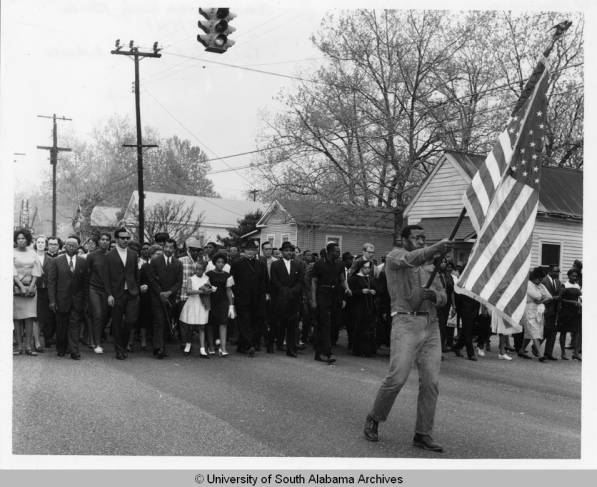EDITOR’S NOTE: During the turbulent 1960s when the civil rights movement made Selma and Birmingham Alabama infamous, turning Martin Luther King Jr. of Atlanta and other activists into household names, including Fred Shuttlesworth of Birmingham, there were other activists in other cities who never became so well known. The political and business establishment of Mobile, for example, never wanted to be known for civil rights activism. But there were worthy activists in places like Mobile, including Jerry H. Pogue, who recently died with no local, state or national fanfare. Pogue grew up in Mobile and the neighboring city of Prichard, where his role in the civil rights movement began. He became a national organizer for King’s Southern Christian Leadership Conference and headed the SCLC’s Washington, DC office when King was killed. Pogue returned then to the Mobile area, where he remained the rest of his life as a teacher and community activist.
David Underhill, the Associate Editor of the New American Journal, was a long-time fellow activist and friend to Mr. Pogue. On February 4, he delivered these remarks at Mr. Pogue’s funeral at the Antioch Baptist Church in Prichard. Mr. Pogue was 80.

Mobile civil rights activist Jerry Pogue leads a memorial march in Mobile, Alabama, following the assassination of Martin Luther King, Jr. in 1968: Image courtesy of the University of South Alabama
JERRY H. POGUE, 1937-2017
In 1965 the civil rights movement had turned the country turbulent. I was a youngster who, typically, did not know nearly as much as I believed I did. But I did have enough sense to realize I did not understand much of what that movement was about. So I started asking how I could find out and the answer was: Go out to Dorothy Williams’ home in Prichard. Everything that happens around the Mobile area in that regard passes first through her house, particularly through her kitchen, that’s where the meetings gather.
So I went there, just a couple blocks down this street from here. And there I met a fellow with the look and manner of somebody who could trample right over you and leave you flat—which is what he did a few years before carrying the football as a running back on County’s championship teams. But now he was quoting ancient philosophers like Plato and Socrates about what justice and fairness are and how to arrange government and society to achieve these things. He wasn’t just reciting this stuff like lessons memorized for classes. He was describing how to apply these ideas, right here, right now. And I thought: I’d better pay attention to this. And I did for all the years following.
Out of sessions like that at Dorothy Williams’ house grew events like the one shown in the photo of Jerry bearing a big American flag and leading a march along the street toward Mobile’s downtown civic center for a memorial service after Martin Luther King was killed. That picture is in your program, it’s in history books, it’s in the history museum downtown. But the picture doesn’t tell you what kept him going forward.
The risk of arrest and worse was very high that day, as always at such events. And Jerry did indeed get arrested and worse many times. But that day these things did not occur, although the authorities wanted very much for that march not to happen. They tried and failed to talk the organizers out of doing it. So they put machine guns on the front steps of the civic center and blocked the avenue leading there with the national guard. The soldiers were holding their rifles with bayonets leveled and ready. This sight was supposed to frighten you into stopping and going home. If Jerry had stopped the thousands of people behind him would have stopped too and that would have ended the march. Yes, he was frightened, but he did not stop. He carried that flag straight into the ranks of the national guard while praying to himself: Our Father who art in heaven, hallowed be thy name. Thy kingdom come thy will be done, on earth as it is in heaven. Our Father who art in heaven…
And the Alabama national guard parted like the Red Sea to let the people of Israel flee from bondage. And the march continued to the civic center, where the machine guns turned aside. For those who wonder whether prayer is answered, there’s your evidence.
After that Jerry moved into a weathered little house on a short deadend street not far from here. It was so neglected by the city, so sick with ruts, potholes and puddles rarely repaired, that we used to joke about it reverting back toward the beginning of the world and speculate if it would reach the first day of creation when the earth was without form and void. Little by little, then more so upon the passing of Dorothy Williams, that house became the place where things happened before their public appearance.
There are bushes at the end of that street. Jerry feared that some night when entering his door after a meeting or a class he’d taught he would hear shots from those bushes and feel the bullets tearing into his back. That’s how much some defenders of the old ways disliked the things he was doing. But this fear didn’t stop him from doing those things.
One of the reasons for this anger toward him was the leaflets often used to alert people about demonstrations and other actions. They would appear as if by magic on the streets overnight across the Mobile area. An old hand-cranked mimeograph machine turned them out by the hundreds in that little house. The stencils printing them on that machine had very effective wording and skillfully drawn cartoon style illustrations to deliver their messages. This was supposedly the work of somebody called The Man from Birmingham. I was sworn to eternal secrecy about the actual author. But I can tell you his initials were J H P.
Sometimes thousands of leaflets were needed. The creaky little mimeo machine couldn’t handle that. Thanks are due to the archbishop of Mobile for these big printing jobs. Jerry sought friends and allies wherever he could find them. These included the Catholic nuns at Heart of Mary church and school on the Avenue downtown. They had access to the school and church’s paper supplies and printing equipment. Through the intercession of these nuns the archbishop gave more assistance to the civil rights movement and other organizing activities than he ever knew or intended.
Lesson plans for classes Jerry taught a few years at the youth center—really a juvenile jail—also came from that house. He was supposed to instruct them about deviant behavior, remedial education, job skills and such. He didn’t exactly do that, of course. His class began with an outline map of the world’s continents and oceans that he drew on the chalkboard. He used that to teach how all of history had led to those tough street children sitting in that jail. He didn’t just make them pay attention and participate in this lesson. He made them want to pay attention and participate. So they would have reason to get out and stay out of there.
From that house also came lesson plans for classes he taught for a little home made school we created to help people solve their own ordinary legal problems, draft and file documents, bring cases to small claims court without paying a lawyer to do these things. I was the administration, Jerry was the faculty. He had a law degree and taught law school quality classes in whatever spaces we could scrounge. Homework was required, and when you came to class you’d better “know your facts” about the assigned cases, as Jerry put it. If you tried to “woof” your way through class instead, you would regret it. For this and related activities he was arrested and locked into metro jail, charged with practicing law without a license. There was no genuine case against him, and he was eventually not convicted of anything. This arrest was to harass him into stopping what he was doing. But he kept right on, of course.
With the law classes and document drafting. With assistance to inmates in state prisons who needed help appealing their convictions, or getting out on parole, or simply staying in contact with their families and communities. All of this and more was done with usually no budget, no staff, no supplies, no equipment—nothing but hope and determination.
And it never stopped, though in recent years declining health slowed and distracted him. But he kept a regular routine that included going on weekdays to the Whataburger a mile up the street from here with his papers and books. It was a second office for him. And on Sundays, after services here, he would go there and meet me. We called it the Church of the Whataburger, where we read the Sunday paper and reviewed the state of the world.
All the workers there knew him by name. So did the regular customers. The called him Reverend Pogue. Sometimes they asked him for help with legal or other problems. Without fail he was friendly, courteous and helpful to them all—black and white and any others who might appear. All of them were ordinary, unglamorous folks in that ordinary, unglamorous place—not a Mardi Gras king or queen ever among them or even members of the court.
Jerry was comfortable in a setting like that, despite all his higher education and all the time he had passed in loftier places.
By examples like these stretching across decades he saved me from racism. I don’t mean from racism aimed at me, I mean racism built into me.
Youngsters here today may not know. We more senior citizens do. In our youth everywhere you went and everything you did was tinted by an awareness of the outward appearance of those you encountered. This was not only an awareness of racial differences but also visible differences of social and economic status. We were schooled into this from birth onward, mentally sorting people into boxes, categories, layers and behaving accordingly. These practices are not as severe as they used to be, but they are always poised to return. It offended Jerry that he could use a phrase like downtrodden masses because it described an actual condition. He didn’t believe downtrodden masses should exist—not anywhere.
In keeping with the things Jerry said the day I met him, he never accepted that we must live according to these established rules and systems. By example he showed me and others how to lead our lives the way he did.
Yes, he sometimes fell short of these standards himself—fell short of the glory of god the preacher would say, I suppose—as we all do. But he was vigilant about detecting and correcting these shortfalls in himself, something we don’t all do.
Your religion is what you do, he used to say. Not what you pray or profess or recite. Your religion is what you do. These steadfast examples he set were his religion.
That is what he meant by saying Keep the Faith. And repeating, lest we forget, Keep the Faith. May those of us left behind continue to strive toward Keeping the Faith.













